
Breakout Sessions
Check the overview of the conference schedule for plenary sessions, special events, and meals.
Day 1: Wednesday, October 26, 2022
WEDNESDAY AM SESSIONS 11:00am-12:30pm
Power Networks (RCNV Hall)
Power, Networks, and Ecosystems: Findings and Lessons from Participatory Research with Organizing Networks
MODERATOR: Jennifer Ito (USC Equity Research Institute), PANELISTS: Jerome Dillard (EXPO) David Liners, (WISDOM), Victoria Faust (Population Health Institute at UW Madison), Shoshanna Spector (Faith in Indiana), Jyoti Gupta (Vanderbilt University), Mazahir Salih (Center for Worker Justice of Eastern Iowa), and Robin Clark-Bennett (University of Iowa)
DESCRIPTION: This panel will share findings and lessons from community-academic partnerships exploring the forms and dynamics of organization as well as the contexts that facilitate base-building and community power building that centers communities disproportionately impacted by systems of oppression, including formerly incarcerated people, people impacted by the criminal, legal, and deportation systems, and immigrant and low-wage workers facing workplace abuses. The power-building efforts represented on this panel draw from approaches of organizing networks in Wisconsin, Indiana, and Eastern Iowa.
Intersectional Solidarities (Paradox Room A)
Teaching while Black & Queer: ‘Making a Way’ in the Progressive Dystopia of the Higher Education System
PRESENTERS: shah noor hussein (UCSC)
DESCRIPTION: By attending to both race and gender dynamics in the classroom, Black feminist educators have revolutionized the classroom as an inclusive space for critical thinking and democratic education. Through this institutional unfolding, Black feminist scholars have attuned academic ears to the issues of shame, respect, and conflict, as well as both community and self-care for students and teachers. In this paper, I elucidate my own experiences with teaching at the intersections, as a young, black, queer academic who is in the early stages of their academic career.
Building Solidarity at the Intersections of Black and Indigenous Storying
PRESENTERS: Nathaniel D. Stewart (University of Minnesota), Lauren Thompson (Alliance College Ready Middle Academy #8)
DESCRIPTION: Lauren, an Indigenous educator activist and middle school teacher, and Nate, a Black scholar activist and former middle school teacher, connected after Lauren responded to Nate’s call for Black, Brown, and Indigenous teacher activists to co-create knowledge in an anti-colonial educational policy envisioning project. We share reflections, hopes, and dreams of Black and Indigenous solidarity from this project and will juxtapose them to students, organizers, scholars, and activists engaging in similar justice-oriented and multiethnic/racial activities.
Abolitionist Theatre-making: Performing Liberatory Worlds
PRESENTERS: Rivka Eckert (SUNY Potsdam)
DESCRIPTION: In this session I will lay the foundation of abolitionist theatre-making, highlight selected projects, and offer practices from a book-length project.
Indigenous Environmental Justice Accomplishments, and the Dos and Don’ts of Non-Indigenous Allies, Accomplices, Co-conspirators
PRESENTERS: Waniya Locke (Standing Rock Sioux Tribe) & Tim Scott (Central Connecticut State University)
DESCRIPTION: Indigenous environmental justice movements have many fronts tied to decolonization, from protecting water and defending land against extractive industries, and stopping climate catastrophe; to the enforcement of treaty rights, land back, rematriation and missing and murdered Indigenous women & girls. Non-Indigenous activists are often welcomed into these sacred resistance spaces, and while some are able to effectively acclimate as accomplices, many others are not. This presentation will discuss these inherent challenges
University-Community Partnerships (Paradox Room B)
Institutional Pathways for Community-Engaged Scholarship (in Central New York)
PANELISTS: Dr. Jonnell Robinson, Dr. Sean Drake , Dr. Nicole L. Fonger, Amanda Beavin, Lauren Ashby (Syracuse University)
DESCRIPTION: We will bring together community-engaged scholars at Syracuse University to share their experiences building university-community partnerships on community concerns ranging from housing, educational equity, refugee resettlement and education, and food justice in Syracuse, NY. Our panel highlights the following aims of the All-In conference: 1) building institutional support for collaborative research, 2) navigating community partnerships, and 3) creating sustainable and equitable knowledge networks. Our proposed panel will reflect on connections across the following projects: Syracuse Community Geography; The Engaged Humanities Network; Research with New American youth at a co-ethnic community center/afterschool program; Community-engaged social justice mathematics curriculum, co-created with a local high school; and Graduate student engaged research through existing campus-community networks.
Centering Native Histories (Paradox Room C)
Rethinking Research: Working in Native Communities Today
PANELISTS: Martin Rizzo Martinez (California State Parks), Rick Flores (UCSC), Michael Grone (California State Parks) and Rebecca Hernandez (UCSC)
DESCRIPTION: In more recent years non-Native scholars and researchers have made changes in their approach to working with American Indians and tribes. These newer methods allow for tribal members to be centered in their own histories and provide a more accurate representation of Native people today. This panel session will include short presentations by three local scholars who work with the Amah Mutsun Tribal Band.
Grassroots Organizing (Paradox Room D)
Community Voices on the Experiences and Future Vision for CBPR
PANELISTS: Dr. P Qasimah Boston (Tallahassee Food Network) Dr. Bruce Strouble (Citizens for a Sustainable Future), Queen Mother Maisha Mitchell (Tallahassee Food Network), Dr. Mildred McClain (Harambee House), Kim Wasserman (Little Village Environmental Justice Organization), Jose Acosta (Little Village Environmental Justice Organization), Beto Lugo-Martinez (CleanAirNow), David A. Rahn (University of Kansas)
DESCRIPTION: Grassroot leaders from the Moving Forward Network’s membership will share their experiences with CBPR projects. They will highlight both the positives and challenges as well as their vision for community within a CBPR framework – one where community is centered throughout every step of the process.
Youth Agency (Paradox Grove Room)
Commitment to Pedagogical Partners in Early Childhood
PRESENTERS: Paige M. Bray (URBAN & Center for Montessori Studies, University of Hartford) and Erin M. Kenney (Hartwick College)
DESCRIPTION: Insights and vignettes illustrate elements of how values-informed partnerships are contributing to the early childhood landscape. Implications for community-engaged scholarship and amplification of equitable practice in community settings relevant to early childhood families and practitioners are explicated.
Investing in Parents as Change Agents
PRESENTERS: Adie Simmons, Cathy Liu Scott, Liliana Uribe (Washington Family Engagement)
DESCRIPTION: The Parent and Child Leadership Training Institute is a two-generational, agency-building program that teaches families to develop critical thinking and public speaking skills, understand the function of society’s systems, create personal goals that change their lives and the lives of others. Our graduates develop passion, purpose, and a long-lasting sense of urgency to influence societal transformation.
Growing Educational Pathways for Food Sovereignty
PRESENTERS: Leah Joyner (CSU Sacramento), Adrienne Cachelin (University of Utah)
DESCRIPTION: Our project explores how culturally sustaining urban agriculture partnerships can promote sense of belonging for marginalized students. This project emerges from two ongoing lines of community-based research. One line explores barriers to educational success for Westside students, identifying belonging as a key deficit. The second explores the root causes of food injustice in the Westside. Thus, we are launching a series of critical programs to promote sense of belonging through food sovereignty education.
Teaching Global Blackness in Baltimore
PRESENTERS: Moriah Ray (The African Diaspora Alliance) and Theresa Hice-Fromille (UCSC)
DESCRIPTION: Community-engaged research collaboration can reveal the unique ways that community-based educational organizations construct a curriculum imbued with political meaning that contradicts the nationalist neoliberal education offered within U.S. public schools. Presenters will highlight the processes of 1) designing global Black community-based curriculum and 2) analyzing cultural texts produced by the organizations.
Ethics & Methods (Paradox Cypress Room)
Understanding The Story Behind The Data
PRESENTERS: Anahy Salcedo (Promise Partnership of Salt Lake)
DESCRIPTION: Sharing the experience of conducting Community Based Research within a results based community organization/nonprofit as well as sharing the successes, challenges, and lessons we have learned along the way.
Aligning Community-Engaged Research Methods with Diverse Community Organizing Approaches
PRESENTERS: Chad Raphael (Santa Clara University), Martha Matsuoka (Occidental College)
DESCRIPTION: Community-engaged researchers need to be familiar with the diversity of community organizing traditions because they can prioritize different methods and goals for research. We construct a typology of community-engaged research that aligns especially well with several major organizing approaches: Alinskyite, Freirean, feminist and women of color, community building and resilience-based, and transformative organizing.
Devil’s in the Details: Evolving Practices for Data Sharing and Co-authorship for Community-Driven Studies
PRESENTERS: Ildi Carlisle-Cummins, Alondra Santiago (California Institute for Rural Studies)
DESCRIPTION: Researchers from the California Institute for Rural Studies (CIRS), will share their current data-sharing and study-ownership practices for collective, community-driven studies. Our data-sharing and co-authorship agreements are a continual work-in-progress and we would like to be in conversation with other community-research collectives about the latest best practices that root studies firmly in communities.
Central Coast Regional Equity Initiative
PRESENTERS: Kathleen Knight (The Fund for Santa Barbara)
DESCRIPTION: A collaborative community-engaged research partnership, the Central Coast Regional Equity Initiative leverages rigorous community-engaged research, community power, and multi-sectoral resources to bring socioeconomic inequities (and the price we pay for them) to light, and establishes concrete guideposts for regional equity. Through establishing an action-orientated framework for advancing equity in California’s Central Coast, this project marks a critical step in research and organizing for social change.
WEDNESDAY PM SESSIONS 1:30pm-3:00pm
Solidarity Economics (RCNV Hall)
Building Partnerships for a More Inclusive Economy
MODERATOR: Ken Smith SIEDI Project Manager; PANELISTS: Cheng Ung and Liz Posey, James Irvine Foundation; Laurel Lee-Alexander, Community Foundation for Monterey County; Chris Brown, ALBA (Agricultural and Land-Based Training Association) ; Raul Lazaro, CBDIO (Centro Binacional para el Desarrollo Indígena Oaxaqueño); Natalie Herendeen, Adriana Melgoza, CCA (Center for Community Advocacy); Elizabeth Jimenez, Joe DeRuosi, Gabriela Manzo, Rancho Cielo; Steve Lieberman, Gabriela Chavez, LFC; Alma Cervantes, BHC (Building Healthy Communities); Maria Elena Manzo, Maria Rodriguez, Mujeres en Accion; Cesar Lara, Monterey Bay Central Labor Council; Joy Rubey, Kaki Rusmore, Allison Guevara, Elsa Quezada, David Mancera, Barbara Meister, SIEDI Mentor Team; Mayra Bernabe, COPA and SIEDI Advisory Council Member;
DESCRIPTION: The Salinas Inclusive Economic Development Initiative (SIEDI) aims to transform our economy in the Salinas Region. This multi-year effort is fostering new relationships so that economic development decisions in the Salinas Valley will produce a more equitable economy. In this session, we’ll review and discuss with conference participants our progress in year one pulling nine diverse community organizations together to create the potential for transformational power shifts in the way our economy is developed.
Climate (RCNV Community Room)
Community-Defined Decarbonization: Reflecting Rural and Tribal Desires for an Equitable Clean Energy Transition in Washington State
PRESENTERS: Mariah D. Caballero (Vanderbilt University)
DESCRIPTION: Sharing the results of an ongoing collaboration with the Clean Energy Transition Institute, where rural and Tribal community leaders asked about their desires for economic development and community health amidst the changing climate. Interviews identified several strengths, challenges, and desires for equitable residential decarbonization, spanning three different categories: socioeconomic, market, and regulatory.
Toxic tides and environmental justice: Collaborative research on sea level rise and flooding of hazardous sites in coastal California
PRESENTERS: Amee Raval (Asian Pacific Environmental Network), Seigi Karasaki (UC Berkeley)
DESCRIPTION: Three years ago, we – a coalition of environmental justice organizations and researchers at UC and Climate Central – came together to better understand the implications of sea level rise (SLR) for contaminant releases from coastal sites that store and use hazardous materials. We estimated flood risk at hazardous sites under different SLR scenarios in relation to indicators of social disadvantage and shared findings via a series of webinars and online data tool in an effort to advance equitable climate resilience planning.
Co-powering Community Air Protection in south Stockton
PRESENTERS: Dr. Catherine Garoupa White (Central Valley Air Quality Coalition), Cynthia Pinto Cabrera (Central Valley Air Quality Coalition), Matt Holmes (Little Manila Rising)
DESCRIPTION: This panel will discuss the process and outcomes thus far from a co-designed and community-led effort to assess and address air pollution and environmental justice concerns in south Stockton, one of California’s most polluted neighborhoods. The collaborative includes community based organizations, advocates, and researchers as well as the Enforcement Division of the California Air Resources Board.
Co-Design and Co-Production: Hacking the University for Environmental Justice Movement Impact
PRESENTERS: Mike Harrington, Marouh Hussein, and Jennifer Santos Ramirez (Tishman Environment and Design Center at The New School)
DESCRIPTION: The Center is experimenting with collaborative forms of practice and research that bridge disciplines as well as academic and movement knowledge. These entanglements with the EJ movement produce insights into the types of systems changes required of higher education institutions to live up to the promise of inclusive, democratic, community engaged spaces of learning and social change. Specifically, the presentation will invite a discussion of research design practices that can foster co-learning and capacity building among all participants; that values local knowledge and expertise; and builds on strengths and resources within a community.
Community Power Building (Paradox Room A)
Grassroots Leadership, Resiliency, and the Power of Participatory Research
PANELISTS: Emily Jade Aguilar (Communities United), Roxanne Smith (Communities United), Mirna Ruiz (MUA: Mujeres Unidas y Activas), Silvia Lopez (MUA: Mujeres Unidas y Activas)
MODERATOR: Ashley Thomas (USC Equity Research Institute)
DESCRIPTION: Join this conversation with organizers and scholars about how grassroots leadership and resiliency is built, measured, and sustained while advancing campaigns to achieve racial justice and transformative change–and the power of participatory research.
Youth (Paradox Room B)
Something “Just” Happened: 2021 School Desegregation in Sausalito, CA
PRESENTER: David Duncan (UCSC)
DESCRIPTION: This project will examine my work with the Sausalito Marin City School District in creating an ongoing oral history project on the 1965 and 2021 desegregation efforts in the district.
Research and the challenge of participation. The example of participatory research “Distressed neighborhoods through the lens of youth” (France)
PRESENTERS: Marie-Hélène Bacqué, Jeanne Demoulin (Université Paris Nanterre)
DESCRIPTION: We’d like to present a participatory and multidisciplinary research project, designed to co-create knowledge from a social justice perspective, “Pop-Part, les quartiers populaires au prisme de la jeunesse”. Conducted between 2017 and 2022 in 10 distressed neighborhoods of Ile-de-France (Paris region, France), this project brought together about twenty university researchers, 130 young people from these neighbourhoods and youth professionals who work there. This project aimed to analyze the social and urban reconfigurations underway in the distressed neighbourhoods from the perspective of youth. To do this, it relies on a threefold approach: it is based on this youth’s experience; it grasps the metropolitan area from the perspective of distressed neighbourhoods; it develops participatory methods in a citizen sciences perspective. It responded to methodological, epistemological and theoretical issues that we would like to highlight. hods in a citizen sciences perspective.
Incentives for Youth Programming: A Data Analysis of No Boundaries Youth Organizers of West Baltimore
PRESENTER: Eean Logan (Choice Program @ UMBC)
DESCRIPTION: This presentation will guide the audience through data gathered by the No Boundaries Coalition, telling the story of the challenges and successes of paid Youth Programming through a secondary data analysis conducted during the 2018 – 2020 school years. The impact or potential impact will be shown in the data analysis through trends in attendance, compensation, and enrollment while considering the driving factors over time.
Indigenous knowledge and environment (Paradox Room C)
A SHARED Future (Achieving Strength Health, and Autonomy through Renewable Energy Development for the Future): Sharing our Intersectoral Research for Healthy Lands, Healthy Peoples
PANELISTS: Heather Castleden (University of Victoria), Melissa Naatoi’Ihkpiakii Quesnelle (Kainai Nation)
DESCRIPTION: Indigenous peoples are the first to experience the impacts of energy development, resource extraction, fossil fuel combustion, and associated climate change in their territories. As such, Indigenous peoples are positioned to take on leadership roles towards a just transition. In this panel session, we share stories from several of the Indigenous-led renewable energy projects supported through A SHARED Future Research Program.
Youth Participatory Action Research (Paradox Room D)
Growing a YPAR Network towards School Change
PRESENTERS: Ryan Oto (Brooklyn Center Community Schools), Abigail Rombalski (YoUthROC (Minnesota)), Amina Smaller (YoUthROC (University of Minnesota))
DESCRIPTION: These Twin Cities YPAR organizers have created ongoing relationships with middle, high school, and college-aged youth to share kinship, research, and social action. In this session we will hear from young adult and older adult co-conspirators who highlight 1) the challenges of doing this work as adults within institutions and 2) the possibilities when groups come together.
Youth Imagining Themselves Into Community
PRESENTERS: Patricia Enciso (OSU/ Westside StoryARTS Collaborative)
DESCRIPTION: We describe a storytelling project with youth, whose superhero stories, set in their neighborhood, describe what is lively and valued in their community and what holds potential for reimagining the present and enacting more just futures. Through this project, youth became knowledge-producers who reclaimed the meaning of local spaces and proposed new narratives for themselves and others.
Centering Youth Voices in Adult Allyship
PRESENTERS: S Sylvane Vaccarino Ruiz (UCSC Community Psychology Research and Action Team), Malía Easter (United Way YAN/JS), Edita Juarez (United Way YAN/JS), YaQi Wang (United Way YAN/JS)
DESCRIPTION: This focus group study offers recommendations for adults in supporting youth. Youth in our participatory action research project speak back to these results.
Youth Climate Voices: Using oral history to co-create knowledge with young climate activists
PRESENTER: Sally Elizabeth Neas (UC Agriculture and Natural Resources)
DESCRIPTION: This presentation will present a case study where oral histories were used as a participatory research methodology to build knowledge in partnership and solidarity with young climate activists. The presentation will address ethical and practical considerations and will highlight creative uses of the oral histories.
Migrant Justice (Paradox Grove Room)
Campaigns for Immigrant Voting Rights
PRESENTER: Ron Hayduk (San Francisco State University)
DESCRIPTION: This presentation explores cases where community-based organizations partnered with scholars to wage successful campaigns, including in California, NY and others states.
Creating Home Away from Home: The Nepali Diaspora and Home-Making in the US
PRESENTER: Sudikshya Bhandari (UC Davis)
DESCRIPTION: This presentation focuses on using ethnographic and participatory approaches to understand the homemaking process of Nepali immigrants in California and their perspectives on the creation of meaningful spaces.
affirming refugee wisdoms in education: lessons in equitable co-production of knowledge
PRESENTER: Alexandra Greene (Vrije Universiteit Amsterdam)
DESCRIPTION: This presentation offers two case studies of education advocacy, in which refugees are recognized as changemakers, and their subjectivities, knowledges, practices, and creativity are elevated. By sharing and reflecting upon concrete examples of collectivity, co-creation, and collaboration, this presentation demonstrates that refugee wisdoms are not just for refugees, but rather, carry lessons for how to engage with communities more broadly, transform structures of harm within education, and deepen inclusion in a way that uplifts all of us – not just some of us.
Equity in Partnerships (Paradox Cypress)
Understanding Equity in Research-Practice Partnerships: Working toward a framework for more transformative collaborations
PRESENTERS: Caitlin Farrell (University of Colorado Boulder), Kristina Stamatis (University of Nebraska Omaha), Paula Arce-Trigatti (Rice University)
DESCRIPTION: This session will explore the ways that research-practice partnerships have framed equity in their work together. We will present a typology of equity in mission and process developed from interviews with more than 96 researchers and practitioners engaged in partnership work.
Day 2: Thursday, October 27, 2022
THURSDAY AM SESSIONS 10:30am-12:00pm
Community Power Building (Humanities 1 Room 210)
Academics, Community Power and Transformation
PRESENTERS: Chris Benner (UCSC). Respondents: Cesar Lara (Monterey Bay Central Labor County), Jonathan Stith (Alliance for Educational Justice), Elizabeth Posey (Irvine Foundation), Jenny Irons (W.T. Grant Foundation), Martha Matsuoka (Occidental College)
DESCRIPTION: In this session, we will present preliminary recommendations from a study of best practices in collaborations between community power-building organizations and academics. Through a facilitated conversation with attendees, we hope to help advance new thinking and conversations around the links between community power, health equity, and research.
Economic Justice (Humanities 1 Room 202)
Advancing Economic Justice through Community-University Partnerships
PRESENTERS: Eva Bertram (UCSC/Blum Center), Heather Bullock (UCSC/Blum Center), Maria Cadenas (Santa Cruz Commuity Ventures), Darrie Ganzhorn (Homeless Garden Project), Emily Hentschke (UCSC/Blum Center), Kednel Jean (UCSC/Student Affairs), Lisa Nishioka (UCSC/Blum Center), Sofia Renteria (Second Harvest Food Bank of SC County), Dave Shaw (UCSC/Blum Center)
DESCRIPTION: We discuss community-engaged research that seeks to advance economic justice involving community partners and UCSC’s Blum Center on Poverty, Social Enterprise, and Participatory Governance. Community and university partners share goals, methodological approaches, and key findings from projects related to food and housing insecurity, guaranteed income, and transitional employment programs for people experiencing houselessness, describe the growth and evolution of partnerships, and reflect on strategies for maximizing impact.
Public Humanities (Humanities 1 Room 520)
Public and Community-Engaged Humanities Research
PRESENTERS: Jasmine Alinder, Saskia Nauenberg Dunkell (UCSC Humanities)
DESCRIPTION: This session will be presented by The Humanities Institute and the Humanities Division to feature a range of UC Santa Cruz faculty and students leading public humanities and community-engaged humanities research projects with partners around the world. Panelists will discuss the vital role of collaborative humanities research to build a more just and equitable society.
Watsonville is in the Heart: Reflections on Community-engaged Oral History, Archiving, and Exhibition Curation
MODERATOR: Dr. Kathleen Gutierrez (UCSC); PANELISTS: Christina Ayson Plank (UCSC), Amanda Gamban (United Way of Santa Cruz County), Katrina Pagaduan (Watsonville Is in the Heart); Meleia Simon-Reynolds (Watsonville Is in the Heart)
DESCRIPTION: The round table discussion will feature members of the Watsonville in the Heart (WIITH) team and will highlight the project’s three-pronged approach to community-engaged research: oral history collection, digital archiving, and art and history exhibition curation. The presenters will discuss WIITH’s ethics of co-creation, lessons learned while navigating university and community stakeholders, and the future vision and goals of the WIITH initiative.
Students and Research (Humanities 1 Room 402)
A Qualitative Investigation of University Student Organizing and How It Supports Success at a Minority-Serving Institution
PRESENTER: Andrea DaViera (University of Illinois Chicago/Graduate Employees’ Organization)
DESCRIPTION: The presentation will share insights from an anti-racist, community-engaged research study exploring how student organizers at a minority-serving institution balance their dual labor and strive toward a better future. Preliminary data and autoethnographic field reports demonstrate that students view the social issues that they fight for as intersectional and that they may struggle to balance their organizing labor with their academic commitments.
2022 Workers and Learners Focus Groups Analysis:Ways to Support Workers and Learners During Covid
PRESENTERS: Brittany Montaño (UCLA Labor Center), Qianyi Loo (UCLA Labor Center), Guadalupe Gonzalez (UCLA Institute for Research on Labor and Employment)
DESCRIPTION: The panel will highlight the research findings of a 2022 focus group study conducted by UCLA Labor Studies students as part of the UCLA Labor Center’s, Workers and Learners multi-year project. Our research explores student worker narratives during the pandemic with a particular eye on students’ experiences balancing constant COVID-19 protocol shifts at the university, in the workplace, and in their communities.
Research Collaboration and Empowerment (Humanities 1 Room 620)
Practicing Iteration in Collaborative Research
PRESENTER: Colleen Carroll & Lisa K. Bates, PhD (Portland State University)
DESCRIPTION: Using the Evicted in Oregon community court-watch research project as a case study, the presentation will focus on developing and executing collaborative research projects using iterative design and systems thinking. Including reflections on: the benefits to the research and the community partners; building onramps and offramps while maintaining momentum; strategies for getting unstuck in a single iteration; accommodating multiple needs/desires within the research partnership; practicing internal conflict mediation; and incorporating self-care, community care, and safety plans for researchers – especially if the site or topic of research is a site of individual, community, or generational trauma/violence.
Flipping the Script: Centering Educators in Design Research
PRESENTER: Kemi A. Oyewole (San Francisco Unified School District Instructional Reform Facilitator Design Team)
DESCRIPTION: Our team of school-based instructional reform facilitators used principles of design-based implementation research to envision and launch a peer coaching program to meet community needs. We will share learnings arising as we move from a researcher-led study to educator-led action.
From Relationships to Systems Change: Centering Empowerment in Community-Engaged Research
PRESENTERS: Krista Haapanen, Katherine Wiley, Mariah Caballero (Vanderbilt University)
DESCRIPTION: This panel will first introduce a framework for empowerment in community-engaged research developed for a forthcoming chapter (Haapanen, Wallerstein, and Sanchez-Youngman) in the Cambridge Handbook of Community Empowerment (Ed. Brian Christens). Each panelist will then discuss their own community-engaged research projects and their contribution to empowering processes and outcomes.
Student-Community Research and Pathways after Graduation (Humanities & Social Sciences Room 259)
The Future of Work/ers through the Pandemic Portal
PRESENTERS: Anibel Ferus-Comelo , Taylor Valci, Alexis Mullard, and Zenia Lakhani (UC Berkeley Labor Center)
DESCRIPTION: This panel / paper presentation will outline and share the UC Berkeley Labor Center’s efforts to cultivate labor-engaged scholarship, art and activism among students. It focuses on Labor Studies classes designed to introduce undergraduate and graduate students to the current challenges and innovation tackled within the labor movement.
Building the Road As We March it: Career and Ed Pathways for Student Researchers after Graduation – A UCSC CISER Alumni panel
PRESENTERS: Steve McKay (UCSC), Claudia Lopez (California State University, Long Beach), Ruben Espinoza (Chapman University), Alma Villa (UCSC), Steven Carmona Mora (UCSC), Huzaifa Shahbaz (UCSC), and Sarah Wikle (City of Watsonville)
DESCRIPTION: This session will feature a broad range of “veterans” of multiple Community Initiated Student Engaged Research (CISER) projectsat at UC Santa Cruz (2015-2019), when most of them were graduate or undergraduate students. After participating in research projects on low-wage workers and the affordable housing crisis, these ex-grad students (2) and ex-undergrad students (4) have built on their research and community experiences and gone on to a wide range of occupations and movements. They are now, respectively: a tenure-line professor of sociology at CSU Long Beach; an assistant professor and Director of Latinx and Latin American Studies; an Urban Planner and PhD candidate in Sociology; a Data and Technology Strategist and Data Manager a progressive national non-profit advocacy org; a former senior researcher for the Council on American-Islamic Relations and current PhD candidate in Politics; and an Associate Planner for the City of Watsonville. Come hear their stories and learn about career and education pathways in and beyond academia from student “veterans” of community-engaged research.
Ethnic Studies in High Schools (Humanities & Social Sciences Room 359)
The Localization of Ethnic Studies in Salinas
PRESENTERS: Korina McKinley, Xago Juárez, Mark Gomez, Chrissy Hernandez, Sydney Utley (CSU Monterey Bay)
DESCRIPTION: This presentation will describe the early stages of a project that supports the Salinas Union High School District in localizing their Ethnic Studies curriculum by democratizing archival materials; fostering civic action through participatory action research projects; creating critical service learning and ES pipelines between the local high schools and the local public state university; and finally, creating meaningful partnerships that bridge school and community contexts. In this project local educators, community organizers, students, and artists with substantial Ethnic Studies expertise work with classroom teachers to develop, document, and assess a localized Ethnic Studies curriculum and praxis.
Ethnic Studies Community-University Partnership: Centering Struggle in Research Practice
PRESENTERS: Rekia Jibrin, Cynthia Lewis, Christine Hong, Josephine Pham, Daisy Martin, Ian Slattery, Amanda Lashaw, Michelle Aguilera (UCSC)
DESCRIPTION: This roundtable discussion will describe efforts at: 1) creating partnerships with teachers that center local histories, movement-building and justice-oriented change; 2) developing a certificate program for aspiring and practicing teachers; 3) implementing a professional learning series through the History and Civics Project. Cultivating this collaborative exchange raises important considerations around research ethics, methods, and the centrality of local meaning-making that we identify as interrelated and important for stronger university research partnerships with community members and institutions.
Student Leadership in Service Learning (Humanities & Social Sciences Room 450)
Student Leadership in Service Learning: A Higher Education Model for Transformative Leadership and Change
PRESENTERS: Tyler Gidney, Sydney Utley, Jenny Lopez, Alo Wilson, Dana O’Donnell & Mimi Ghosh (CSU Monterey Bay)
DESCRIPTION: This panel will introduce two unique programs at CSU Monterey Bay: The Service Learning Student Leadership program and College Corps. Our faculty and staff leadership will talk about the various programs and our student leaders will talk about their work, leading to a questions and answer / discussion session.
University Community Engagement (Stevenson Event Center)
Communities of Practice to Sustain Community Engagement in Higher Education
PRESENTERS: Elaine Ikeda (LEAD California), David Donahue (University of San Francisco), and Clayton Hurd (Campus Compact)
DESCRIPTION: The session will focus on utilizing communities of practice (CoPs) as powerful forms of shared learning and exchange to support more equitable, sustainable, and critical practices in community engagement. After an initial framing of the protocol, participants will engage in a simulated CoP experience.
THURSDAY PM SESSIONS 2:30pm-4:00pm
Engaged Arts Research and Praxis (Humanities 1 Room 210)
From the Crossroads: an exploration of art and political praxis
PRESENTERS: Melissa Mack (UCSC), Kristen E. Nelson (UCSC), danielle nanos-luz (Freedom Archives/GABRIELA Oakland), and Angel Dominguez
DESCRIPTION: In this panel artists who have spent time both in academia and in community organizing will explore the point at which art-making, social justice, resistance, and/or memory intersect.
Tech for Good (Humanities 1 Room 202)
Anywear Academy: Creating a girl-focused middle school wearable tech programming camp with advice from local youth
PRESENTER: Katherine Isbister (UCSC)
DESCRIPTION: Anywear Academy invites middle schoolers into roleplay-based programming/crafting projects to create wearables to solve missions together. In this presentation, I’ll describe the camp, and how we worked with youth advisors to shape its design.
Towards Community-Engaged Learning and Research in Engineering
PRESENTER: David Lee (UCSC)
DESCRIPTION: I will describe ongoing work in the Tech4Good Lab at UC Santa Cruz on bridging experiential learning with community-engagement. This includes the Tech4Good Collaboratory, a program providing opportunities for students to learn user research, interface design, and web development while contributing to platforms for education, work, and community engagement, and a course-based community consultancy, in which students in a large project-based course are organized around a large consulting project for local non-profits.
Building a technology and ethics game using iterative crowd-sourcing and community engagement
PRESENTERS: Associate Professor Jon Ellis (Philosophy, director of the UCSC Center for Public Philosophy), Abigail Kaun (Engineering dean’s office), Emily Robertson (Philosophy), James Read (Philosophy)
DESCRIPTION: TEQ Deck, currently in development, will be a deck of playing cards designed to stimulate reflection and civil discourse about ethical questions relating to emerging or anticipated advances in technology. A co-production of the UCSC Center for Public Philosophy and the UCSC Baskin School of Engineering, TEQ Deck has used interdisciplinary crowd-sourcing and community engagement to capture difficult ideas of pressing urgency and to bring those ideas to life in an engaging and even playful way.
Exploring and addressing community need through the international iGEM competition in synthetic biology
PRESENTERS: Abigail Kaun (Baskin School of Engineering) + Student team members
DESCRIPTION: Description: UCSC Baskin Engineering sends a student team to the international iGEM competition which invites multidisciplinary student teams to address real world problems using synthetic biology. Fundamental to the UCSC iGEM program is community engagement, which provides students opportunities to work in partnership with communities, non-profits, and commercial entities such as local farms to advance both the needs of their partners as well as their own personal professional development. These partnerships and the innovations that have emerged from them will be highlighted in this presentation.
Students Working with Communities (Humanities 1 Room 520)
Tejiendo voces y espacios de pertenencia/Weaving together voices and spaces of belonging: Video and photovoice building immigrant strength in Santa Cruz County
PRESENTERS: Program Coordinators: Dr. Leslie López and Dr. Nereida Robles; Joel Lovos, MA; CLV mentors Jocelyn Jiménez; Sara Razo; Plaza Comunitaria members Rosario Chavez, Maura Hernandez, and Flor Lopez
DESCRIPTION: Our panel represents Corre la Voz (CLV)-Senderos Santa Cruz, a University-community partnership that provides afterschool and weekend programming in arts and education for the latinx immigrant community in Santa Cruz. Our session will present a multi-generational and multi-media project on “belonging and not belonging” that we conducted at three sites in Winter, 2022, commenting on our organizational, community-building, and technical strategies as well as outcomes and potential implications/directions for the future.
Connecting Salinas Valley Youth to UCSC Undergraduates: Perspectives on the relationship between environmental justice, critical pedagogy, agroecology, and food sovereignty
PRESENTERS: Tashina Vavuris; Karen Crespo Triveño; Agustín Angel (UCSC)
DESCRIPTION: This panel will discuss topics around an Environmental Justice Youth Leadership Academy and Central Coast Farm Site Visits connecting UCSC undergraduates with youth from the Salinas Valley through EJ-centered pedagogy and research practices. Each presenter will discuss their own positionality, their perspectives on their involvement in the project and discuss how their interests intersect with education and environmental justice.
Solidarity Not Service: Student Technology and Social Justice Projects with Community Partners
PRESENTERS: Elias Macias (UCSC), Mia Perez (UCSC), Preethi Bathula (UCSC), Katerina Bajaj (UCSC), Megan Deavy (UCSC)
DESCRIPTION: The Everett Program for Technology and Social Change at UCSC connects young leaders to empowered communities, where together they use technology and communication to help build a just and sustainable world. In this session, students and fellows in the program will share their recent work with community partners–in Pittsburgh, Costa Rica, Salinas and Santa Cruz. Our work is rooted in a philosophy of solidarity not service learning, captured by the well-known quote from Australian Aboriginal activists: “If you have come here to help me, you are wasting your time. But if you have come because your liberation is bound up with mine, then let us work together.”
Co-Creating Knowledge with Students and Communities (Humanities 1 Room 402)
Co-Creating Knowledge in Critical Community-based Learning Capstones
PRESENTER: Seanna M. Kerrigan (Portland State University)
DESCRIPTION: For over 25 years Portland State University (PSU) has implemented one of the largest community-based Capstone programs in the nation centering Diversity and Equity. This brief presentation will address years our journey adopting a critical community-based learning pedagogy and the implications for our course proposal processes and faculty development to align with this approach.
Immersive Field Education in the Arts
PRESENTER: Jack Chapman (UCSC)
DESCRIPTION: I will be presenting a photo talk about students engaging communities and environments around California as participants in the ART155 California Road Trip, Photo Field Research Quarter. I will be discussing the positive and potentially life changing impacts such offerings create for students in the humanities as well as the communities they interact with.
Case study: D-lab at UC Davis
PRESENTER: Alice Dien (UC Davis)
DESCRIPTION: Using an interdisciplinary approach, D-lab builds project-based courses open to upper-division undergraduate and graduate students from any discipline. Students work in teams and use community-based methods to perform feasibility studies and/or design, build, and test prototypes using technical, social, environmental, and economic lenses. In our courses, students learn how to use their discipline-specific background to solve real-world challenges.
Community Climate Justice (Humanities 1 Room 408)
Creative Community-Driven Climate Research & Planning
PANELISTS: Abigail Reyes (Director, UCI Community Resilience) and Levana Saxon (Co-Director, Partners for Collaborative Change).
DESCRIPTION:
In this interactive workshop we will simulate activities from our “Coliberate” process which is a mashing together of Theater of the Oppressed, Popular Education, Participatory Action Research, and Community-Driven Climate Resilience Planning. We will then share experiences from our pilot project working with a cohort of 10 community-academic place-based teams across California; CAPECA, (Community-Academic Partnership to Advance Equity-Focused Climate Action).
The workshop will create space for sharing skills and stories with a focus on a few key elements and areas of inquiry: 1) Setting up the research to result in actual plans, community power and long-term direct community benefit; 2) Expanding beyond traditional data collection methods for community relevancy, accuracy and power building, and 3) Establishing iterative cycles of inquiry, planning and implementation with a range of stakeholders who maintain accountability to community members.
Workers & Learners (Humanities & Social Sciences Room 259)
Workers and Learners in Los Angeles County
PRESENTERS: Saba Waheed (UCLA Labor Center), Mindy Chen (Dolores Huerta Labor Institute- LA Community College District), Michele Wong (UCLA Labor Center)
DESCRIPTION: The panel will focus on the experiences of undergraduate students who work and study at public colleges and universities in Los Angeles county. In particular, we explore three key areas: 1) the realities of soaring education costs, living expenses, and debt; 2) trying to make ends meet on low-wage jobs; 3) limited outside support (e.g. family, government).
Community-Academic Collaborations(Humanities & Social Sciences Room 359)
New Tools for Building Community-Academic Collaborations
PRESENTERS: Chad Raphael (Santa Clara University), Martha Matsuoka (Occidental College), Chris Bacon (Santa Clara University), Iris Stewart-Frey (Santa Clara University), Fernando Fernandez Levia (Sacred Heart Community Services La Mesa Verde), Andy Ollove (Fresh Approach), Nicholas Jensen (Calfornia Rural Legal Assistance). Others may co-present via pre-recorded talks.
DESCRIPTION: 1. Academic Partners’ Preparation to Collaborate: A Framework for Considering Positionality – Floridalma Boj Lopez (UCLA), Chad Raphael (SCU), Martha Matsuoka (Occidental College). A framework for researchers to examine their positioning in multiple structures of power, including their individual characteristics, disciplines, institutional affiliations, and projects. 2. Collaboration for Safe Water: Joint Advocacy for Water Justice in the Central Valley. Iris Stewart-Frey (SCU), Marisol Aguilar or Nick Jensen (California Rural Legal Assistance). Strategies from building and funding participatory advocacy in government-business-stakeholder processes, including interactive mapping, outreach, and science support. 3. Collaboration for Program Evaluation: A Social Justice Approach to Emergency Food Distribution During Covid-19. Chris Bacon (SCU), rep from Fresh Approach and/or La Mesa Verde. Lessons for participatory evaluation from an assessment of a USDA-funded, community-based approach to food justice in emergency food aid. 4. Training Faculty to Incorporate University-Community Partnerships across the Curriculum. Chad Raphael (SCU). A professional development curriculum for faculty and teaching assistants on how to develop community-engaged research and learning projects in any discipline.
Establishing Principles for Community-Based Research: Story & Power in the Community Research Collaborative
PRESENTERS: Ana Carolina Antunes (University of Utah), Anahy Salcedo (Promise Partnership of Salt Lake), Kimberly Yapias (Community Research Collaborative)
DESCRIPTION: In July 2020, the early days of the COVID-19 pandemic, the Community Research Collaborative (CRC) gathered on Zoom for its first meeting. Over the course of the next nine months, this Salt Lake-based group developed a set of guiding principles for building equitable community-based research partnerships. The principles — along with stories, advice, and tools — were shared in a report titled, In It Together: Community-Based Research Guidelines for Communities and Higher Education (CRC, 2021). The report is now being used as the foundation for developing training, online resources, grants, a community-based research review board, and other projects at the University of Utah, as well as being shared around the country. In this session, members of the CRC, share some of what we did and what we learned in the process of developing our CBR guidelines.
Reviewing Community-Engaged Scholarship (Humanities & Social Sciences Room 450)
Recognizing Community-Engaged Research and Scholarship in Personnel Reviews
PRESENTERS: Rebecca London (UCSC), Elaine Ikeda (LEAD California), Bemmy Maharramli (UCLA), Jenny Irons (William T. Grant Foundation), Jasmine Alinder (UCSC), and Tim Eatman (Rutgers)
DESCRIPTION: This session will explore how community-engaged scholarship can be recognized in the review process. It will also explore ways that institutions of higher education can create policies that acknowledge and uplift these efforts through policy and practice.
Youth Participatory Action Research (Stevenson Event Center)
Conexiones Culturales Testimonio Circle: Stories from knowledge creators in an after-school yPAR intergenerational research team
PRESENTERS: Saskias Casanova, Valeria Alonso Blanco, Amir Abu-Samaha, Jamielin Moreto, Sydrah Al-seigh, Diana Garcia, and five 7th grade researchers (UCSC)
DESCRIPTION: In our circle we will share six testimonios focused on our experiences with building a Youth Participatory Action Research (yPAR) project as a platform for equitable co-production of knowledge. Our stories highlight how as an intergenerational research team, we democratized the co-creation of knowledge and co-created a more humanizing and strengths-based learning community where students develop critical research skills to confront systemic inequalities and injustices.
Circles de Confianza: Latinx Youth Co-creating Spaces of Healing and Confianza in Schools
PRESENTERS: Amy Resendiz-Salazar (Renée Crown Wellness Institution at the University of Colorado Boulder), Blanca E. Trejo Aguilera (Renée Crown Wellness Institution at the University of Colorado Boulder), Camila Cosentino, Emily Gleason (CU Boulder School of Education), Evelyn Colin (Renée Crown Wellness Institution at the University of Colorado Boulder), Ixchel Ramirez, Joanna Nunez Carrazco, Liliana Contreras
DESCRIPTION: In this panel session, students and researchers will co-present the process for designing and implementing Circles de Confianza. We will present the implications and recommendations to change school culture. Finally, we will ask participants to reflect on their own schooling experiences and practice sharing those stories through photography, oral storytelling and writing.
Community Studies (Humanities 1 Room 320)
A Theory and Practice of Activist Pedagogy: the Community Studies model at UCSC
PRESENTERS: Mary Beth Pudup (UCSC), Christine Johnson-Lyons (CMMU ’70), Alyssa Serrano (CMMU ’21), Ángel J. Martínez (CMMU ’09), John Brissenden (CMMU ’77), Maribel Rico Pedroza (CMMU ’20), Jered Lawson (CMMU ’92), Taylor DuFresne (CMMU ’23)
DESCRIPTION: Founded in 1969, Community Studies is UCSC’s oldest interdisciplinary undergraduate degree program, a national pioneer in experiential education, community organizing and social justice, and has a staggering track record of alumni accomplishment and contributions to society for a comparatively small and unorthodox undergraduate program. Its distinctive pedagogy integrates classroom learning and an extended six month field study. In this panel discussion, several generations of alumni reflect on Community Studies’ abiding insistence that communities are spaces of knowledge and expertise that must be brought into direct relationship with the academy—the essence of its theory and practice model.
Moderator: Professor Mary Beth Pudup, Community Studies Program Director
Panelists: Christine Johnson-Lyons, CMMU ‘70 (Retired) Director of Community Action Board of Santa Cruz County
Alyssa Serrano, CMMU ‘21 Project Associate, MidPen Housing Corporation
Ángel J Martínez, MS (all pronouns), CMMU ‘11 Director, Community Engagement at Community Programs Los Angeles County Department of Health Services
John Brissenden, CMMU ‘77 (Retired) Innkeeper and Proprietor of Sorensen’s Resort, Hope Valley, California and community organizer
Maribel Rico Pedroza, CMMU ‘20 Newborn Enrollment Coordinator, First 5 Santa Cruz County
Jered Lawson, CMMU ‘92 Co-Founder and Co-Director, Pie Ranch, San Mateo County
Taylor DuFresne, CMMU ‘23 Currently on full time field with Alliance for Children’s Rights, Los Angeles
POSTER SESSION: THURSDAY 4:30pm-6:00pm
Poster Session & Reception (Cowell Ranch Hay Barn)
I Believe
Exhibitors: Dr. Asia Thogmartin & Kimmie Banks, M.S (Oregon State University)
Reimagining Student Engagement and Scholarship at CSUEB Libraries
Exhibitors: Daisy Muralles, Trix Welch, Kate Pham
Specters of Gentrification: A Community-led Study of Experiences of Gentrification in East Boston
Exhibitor: Josh Lown (Boston College School of Social Work)
Watsonville is in the Heart: Public History and Digital Archive Project
Exhibitor: Meleia Simon-Reynolds (Watsonville is in the Heart)
Youth Voices Art Exhibit
Exhibitor: Ana Carolina Antunes (University of Utah)
We Belong: Collaboration for Community-Engaged Research and Immigrant Justice
Exhibitors: Steve McKay, Marien Reyes, Alysia Leon (UCSC)
UCSC Everett Program for Technology and Social Change
Exhibitors: Chris Benner + students (UCSC)
Corre La Voz
Exhibitors: Leslie Lopez + Corre La Voz participants (UCSC)
Day 3: Friday, October 28, 2022
FRIDAY AM SESSION 9:00am-10:30am
Willful Defiance (RCNV Hall)
Willful Defiance: Activist Scholarship as a Tool for Movement Building
PRESENTERS: Mark R. Warren (UMass Boston), Jonathan Stith (Alliance for Educational Justice), Letha Muhammad (Education Justice Alliance), Patrice Hill (UC Davis/Sacramento), Denisha (Coco) Bland (SAYS/People’s Think Tank), and Vajra Watson (CSU Sacramento)
DESCRIPTION: Combining spoken word poetry, story-telling, and research findings, this session will discuss using scholarship conducted in deep partnership with community organizing groups as a tool for building educational justice movements, highlighting the Willful Defiance project that lifted up the stories of organizing groups and parents and student leaders who built the movement to dismantle the school-to-prison pipeline, identifying lessons and strategies for movement-building.
Reflecting on Practice in the Classroom and Community (RCNV Community Room)
Defamiliarizing Disciplinary Exercises: Creative Writing in Non-Literature Classrooms
PRESENTERS: Kendall Grady, shah noor hussein, Brittney Jimenez (UCSC)
DESCRIPTION: This panel will reflect on the theoretical and practical applications of braiding creative writing practices with disciplinary content across the Humanities and Social Sciences toward a more liberatory classroom. Topics include feminist pedagogy and decolonial thought in applications of creative writing; creative writing and individual/group identities or intersectional/relational subjectivities; creative-critical knowledge production, and disrupting or dilating academic genres and forms.
‘Collectively stronger’: A Scoping Review of the Strategies, Benefits, and Challenges in Community Research Ethics Governance
PRESENTERS: Alize Gunay and Emily Doerksen (McGill University)
DESCRIPTION: Our research team conducted a scoping review of the international literature on community-led research governance initiatives, mapping the existing and aspirational strategies developed by grassroots organizations and communities around the world. In this talk, we will present the results of this review, showcasing the different community-led approaches to the governance of research and their associated benefits and challenges.
Peek-A-Boo
PRESENTER: Noesha McGeHee (Peek-A-Boo Teachings)
DESCRIPTION: Just like the game we played as babies, something’s need to be uncovered for us to see what’s been right in our reach the whole time. We will undergo a transformation through critical self reflection to come to terms with who we are and strive to be as leaders, teachers and humans verse who we pretend to be on a daily basis.
Sustaining Engaged Research (Paradox Room A)
Center for Social Innovation: Data, Narrative, Action
PRESENTERS: Karthick Ramakrishnan (Founder and Director, Center for Social Innovation/Executive Director, Founder: CA 100 / Founder: CSI-UCR, AAPI Data, Census Legacies), Beth Tamayose (Research Director:CSI-UCR), Gary Rettberg (Research Manager:CSI-UCR), Fatima Nelson (Community Engagement Specialist:CSI-UCR)
DESCRIPTION: The Center for Social Innovation will highlight how our framework of Data, Narrative and Action impacts the implementation and sustainability of major initiatives by highlighting the work of three anchor projects: AAPI, IE RISE and ICC-IE.
Creating the Current and Riding the Wave: Persistence and Change in Academic Community Engagement
PRESENTER: Krista A. Haapanen (Vanderbilt University)
DESCRIPTION: This presentation will consider why, despite growing support and incentives for community engagement in health sciences research, even the best-intentioned academic researchers and research centers may struggle to implement and sustain effective community engagement practices. I frame community engagement as a form of interorganizational collaboration, drawing from a single case study of an academic research center to highlight the external forces that may hinder organizations’ capacities to collaborate effectively.
Centering Equity in Engaged Research (Paradox Room B)
Specters of Gentrification: A Community-led Study of Experiences of Gentrification in East Boston
PRESENTER: Josh Lown (Boston College School of Social Work)
DESCRIPTION: Using a combination of ethnographic, geospatial, and photovoice methodologies, this project is exploring the perception of neighborhood change processes and how long-time residents make meaning of its effects on the well-being of residents and the community as a whole.
Practicing Research Justice: Facilitators and barriers to institutional transformation
PRESENTER: Christie Abel, Angelina Majeno, Sara O’Connor (UC Irvine)
DESCRIPTION: This session will discuss the process of initiating, fostering, and sustaining equitable academic-community partnerships, and discuss the institutional, interpersonal, and disciplinary factors that facilitate or hinder equitable partnerships.
Embodying equity as methodology: A view from philanthropy and the nonprofit sector
PRESENTER: Angela K Frusciante (Knowledge Designs to Change)
DESCRIPTION: Meaning making is the heart of human creative agency; shared meaning making is the soul of change efforts that move toward greater equity. This presentation focuses on case examples and the structures, pathways, and spaces where collaborative knowledge construction is contributing to equity building.
Partnering to Advance Justice & Equity (Paradox Room C)
Oregon’s Early Childhood Equity Fund: Co-designing a Culturally-Responsive, Culturally Affirming Evaluation
PRESENTERS: Lorelei Mitchell (Portland State University), Velynn Brown (Black Parent Initiative), Valerie Switzler (Confederated Tribes of Warm Springs), and Patricia Alvarado (Adelante Mujeres)
DESCRIPTION: We will describe and reflect on our evaluation co-design process, highlighting key lessons learned along the way.
CoLab Community-Engaged Research in Monterey County: Relational and Aspirational
PRESENTER: Netta Avineri (Middlebury Institute), Chrissy Hernandez (CSU Monterey Bay), Kent Glenzer (Middlebury Institute), Seth Pollack (CSU Monterey Bay), Carolyn Taylor Meyer (Middlebury Institute)
DESCRIPTION: CoLab is a collaboration between MIIS and CSUMB focused on justice and equity-motivated community engagement through university-community partnerships addressing complex, long-term local problems — through research, professional development, resource mobilization, and joint action. Representatives from both schools (faculty, staff, students) and community partners will discuss challenges and opportunities of leveraging existing connections to build a sustainable model for engagement on local social issues (homelessness in Monterey County, culture change related to increased housing in Gonzales, CA).
Deep Learning through Ethical Partnerships (Paradox Room D)
Research Hub: Ethical Partnerships in Research for Justice presents, From “participation” to “partnership” to “power-shifting”: Voices in Reentry
PRESENTERS: Kresten Froistad-Martin, Sabine Schoenbach, Tonja Fultz, Hanna Dingel, Doruntina Fida, Tamaia Faletogo (Research Hub: Ethical Partnerships in Research for Justice)
DESCRIPTION: Is a truly equitable and ethical co-production of knowledge for action possible between community, academic, and non-profit researchers? Nonprofit researchers worked together with community members with lived experiences of reentry and graduate students to try to answer this question – together. The nonprofit-community-student research team engaged in the project will speak to intention, process, and outcomes through this case study with two arms: one, holding the question of participatory research as attempt to shorten the distance between those experiencing a social issue and those advocating, making decisions, and affecting their lived experience; and two, shedding new light on the carceral system and new insight about outcomes that authentically help communities.
Shared Interest in Appalachia: Community Organizing in a Hidden Legacy of Multiracial Struggle
PRESENTER: julia daniel (SURJ/ University of Colorado, Boulder)
DESCRIPTION: Building off of knowledge gained from mass texting as well as door-to-door canvassing in Appalachian Kentucky, Ohio, and Georgia, this research will explore how organizers engage with working class and poor white people to build a new understanding of the root causes of inequality that develops their mutual interest in challenging white supremacy. We will discuss ways in which through door-to-door canvassing, community meetings, and campaigns, this sense of mutual interest challenges white supremacist ideas and helps build a multi-racial movement to secure more resources and fight inequality.
Youth Participatory Action Research (Paradox Cypress Room)
Letting Go: The Importance of Allowing Students to Fail Forward
PRESENTERS: Beatriz Salazar-Núñez (University of Colorado Boulder), Daniel Walter (Denver West HS), Juleesa DeLeon (11th grade, Denver West HS), Nicole Cerros-Gaytan (12th grade, Denver West HS)
DESCRIPTION: In this session, co-facilitated and co-created with students and a community partner in the TSV program, we explore how to allow students to fail in a way that is productive, building self-efficacy and sustaining commitment to change. Participants will be able to better understand the importance of allowing students to fail, have the opportunity to practice holding conversations after a failure AND success, and engage in reflections of their own practice to leverage strengths and support students navigating change making.
University-Based Community-Engaged Research (Paradox Grove Room)
How can a compromised institution contribute to local social justice efforts?
PRESENTER: Jon Shefner (University of Tennessee)
DESCRIPTION: This paper addresses the legislative and corporate pressures experienced in a large Southern university, and examines an effort to exploit two ideological resources to force my university to play an active role in local social justice work.
Central Coast Regional Equity Initiative
PRESENTERS: Kathleen Knight (The Fund for Santa Barbara)
DESCRIPTION: A collaborative community-engaged research partnership, the Central Coast Regional Equity Initiative leverages rigorous community-engaged research, community power, and multi-sectoral resources to bring socioeconomic inequities (and the price we pay for them) to light, and establishes concrete guideposts for regional equity. Through establishing an action-orientated framework for advancing equity in California’s Central Coast, this project marks a critical step in research and organizing for social change.
Grappling with Power, Pitfalls, and Possibilities of Engaged Research
PRESENTER: May Lin (CSU Long Beach)
DESCRIPTION: I will present reflections on 8 years of engaged research with youth organizing groups in CA, and challenges/ possibilities for more transformative, just research. I address some major findings as well as challenges and possible forms of support towards research justice.
Can a Humanities Center Co-Create?
PRESENTER: Anne D. Basting (University of Wisconsin Milwaukee)
DESCRIPTION: A renowned, interdisciplinary humanities center commits to shifting toward co–creation of knowledge. What does that look like and how is it going? And – is it possible in a purple state?


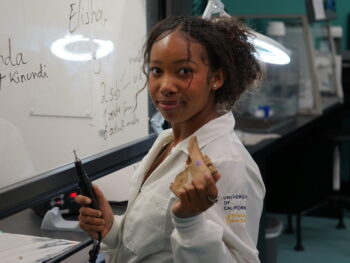
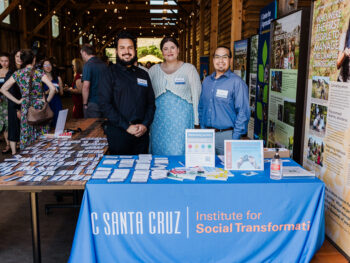
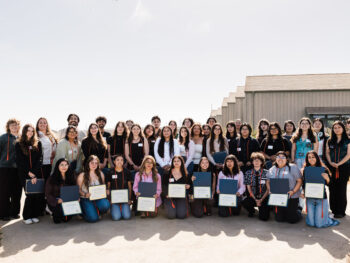
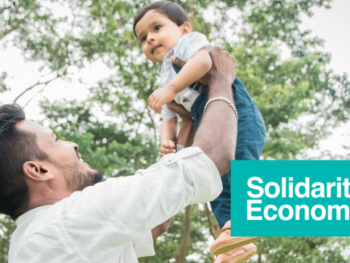
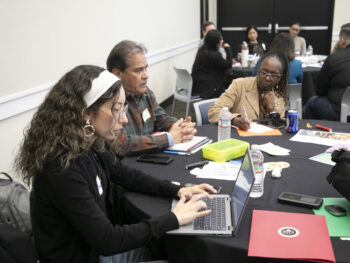
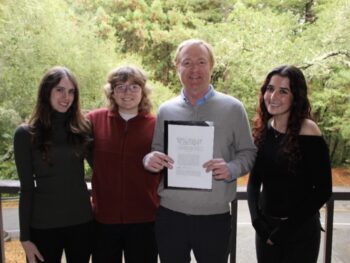
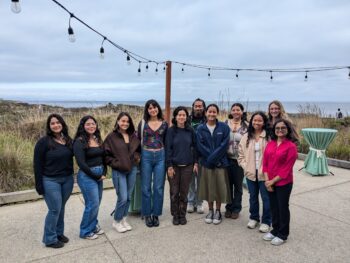
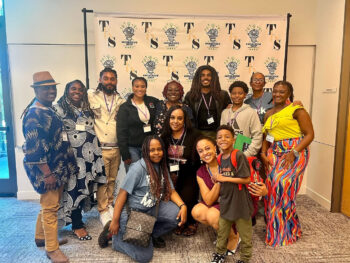
 No Place Like Home: Affordable Housing in Crisis, Santa Cruz County, CA
No Place Like Home: Affordable Housing in Crisis, Santa Cruz County, CA
